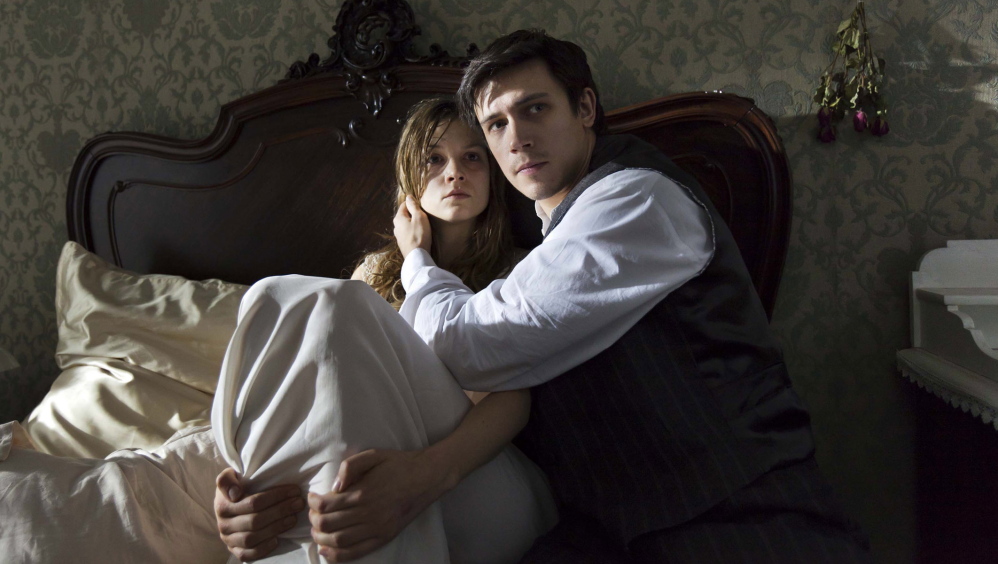‘The Girl and Death’ … a dark Valentine
“No man is rich enough to buy back his past.”
— Oscar Wilde
On a cold day in the past, an old man in his early 70s, boards a train somewhere in Russia carrying a book and some flowers. He falls asleep and is awakened by German passport officers who check his papers. When he arrives at a small German town, he leaves the flowers on the seat beside him, and we know that he has no plans to return. Here the story begins. There will be love, there will be betrayal and there will be death.
In the village, he comes to a decaying building, boarded up and deserted. It has all the crumbling features of a woman out of a Chekov story, a woman lost in time for whom the past has been such a heavy burden that nothing in the present can restore her beauty. Still there is something here, a presence, dark and wet, but unrelenting.
We watch the old man enter the building and roam its dusty halls. There clearly is something here that our traveler has come to find, something he once left here, long ago
Director/writer Jos Sterling, (“The Illusionist”) is preparing for us a story and starts again taking us back 50 years in the past.
A young Russian, Nicolai, (Leonid Bichevin) a student on his way from Moscow to Paris to study the art of medicine, arrives at the gates of a brightly lit building.
Inside, Nicolai discovers what appears to be a privately owned brothel/sanatorium. An aging bell boy opens the door and leads him to the front desk. A room clerk with a somber, almost ghostly visage stands and stares, his eyes are those of a man who has seen unspeakable horror and perhaps even participated in it.
As the bell boy takes him to the stairs, Nicolai scans the occupants of the musty grand room. There are girls in various states of undress, a handful of very old ailing men, some in wheel chairs, being fed, tended to. It’s clearly a brothel for the soon departed, but not on a grand scale. We are in Gogol country, Dostoyevsky land.
In this room, Nicolai will meet Elise (Sylvia Hoeks) skin as pale as water, golden hair and haunted eyes. He is warned that she belongs to a wealthy and elderly baron, who uses this old estate as a private gambling den and brothel for his friends.
Nicolai, taken by her beauty, extends his stay and despite the warnings of the house madam, Nina, (a startling Renata Litvinova) falls hopelessly in love.
Nicolai and Elise, the course of true love runs from perilous to disastrous. The baron is evil and dangerous. Nicolai’s plea for Elise is rebuffed, time and again, over a period of three years, Nicolai returns and fails.
Clearly, Elise is a prisoner of a haunted past, bound by invisible chains. But Nicolai will be back, years later, rich and successful, for a final act of revenge. It will be an ugly act and bloody.
“The Girl and Death,” written by Stelling and Bert Rijkelijkhuizen, is a lyrical poem of the unseen, a dark Valentine, sent from the past and opened for us to see in the very final moments. Cinematographer Goert Giltay is an artist at work throughout, cutting and assembling a dark Valentine.
Sylvia Hoeks is Elise, a flower at the start, a burst of wind in the end. She is an enchanting, magical actor.
Bichevin as the young Nicolai, is superb, shadowed only by Sergey Makovetskiy’s the older Doctor Nicolai.
All of the players are superb, with one brilliant exception: Svetlana Svetlichnaya, as the aging, dying Nina, the once young madam. In a film where the story is told and enhanced by eyes, Svetlana’s take it to the level of literature.
In an age of big, fast moving films, “Girl” will seem, at times, slow moving, especially in the early scenes. But it is tale well told, and with love. The rewards are many.
J.P. Devine is a former stage and screen actor.
Send questions/comments to the editors.



Success. Please wait for the page to reload. If the page does not reload within 5 seconds, please refresh the page.
Enter your email and password to access comments.
Hi, to comment on stories you must . This profile is in addition to your subscription and website login.
Already have a commenting profile? .
Invalid username/password.
Please check your email to confirm and complete your registration.
Only subscribers are eligible to post comments. Please subscribe or login first for digital access. Here’s why.
Use the form below to reset your password. When you've submitted your account email, we will send an email with a reset code.